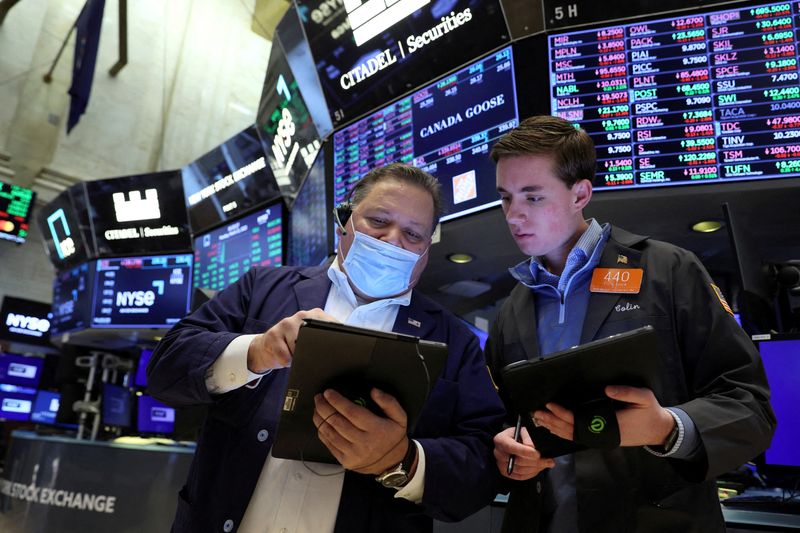By David Randall
NEW YORK (Reuters) -The Federal Reserve's determination to raise interest rates until it squashes the highest inflation in decades is darkening the outlook across Wall Street, as U.S. stocks stand on the cusp of a bear market and warnings of a recession grow louder.
At issue is the so-called Fed put, or investors’ belief that the Fed will take action if stocks fall too deeply, even though it has no mandate to maintain asset prices. One oft-cited example of the phenomenon, which is named after a hedging derivative used to protect against market falls, occurred when the Fed halted a rate hiking cycle in early 2019 after a stock market tantrum.
This time around, the Fed’s insistence that it will raise rates as high as needed to tame surging inflation has bolstered the argument that policymakers will be less sensitive to market volatility - threatening more pain for investors.
A recent survey by BofA Global Research showed fund managers now expect the Fed to step in at 3,529 on the S&P 500, compared with expectations of 3,700 in February. Such a drop would constitute a 26% decline from the S&P’s Jan. 3 closing high.
The index, which closed Friday at 3,901.36, is already down almost 19% from that high this year on an intraday basis - close to the 20% decline that would confirm a bear market, according to some definitions. [.N]
"The Fed has bigger fish to fry and that's the inflation problem," said Phil Orlando, chief equity market strategist at Federated Hermes (NYSE:FHI), who is increasing his cash levels. "The 'Fed put' is kaput until the central bank is confident that they're no longer behind the curve."
As a result, some investors are digging in for a long slog. BofA’s survey showed cash allocations at a two-decade high, while bets against technology stocks stand at their highest since 2006.
Strategists at Goldman Sachs (NYSE:GS), meanwhile, earlier this week published a “Recession manual for US equities” in response to client inquiries on how stocks will perform in a downturn. Barclays (LON:BARC) analysts said that numerous negative near-term catalysts mean the risks for stocks “remain firmly stacked to the downside."
The S&P 500 closed broadly unchanged on Friday, reversing a sharp intraday decline that had briefly put it into bear market territory. The index marked its seventh straight week of losses, the longest streak since 2001.
Jason England, global bonds portfolio manager at Janus Henderson Investors, believes the index needs to fall at least another 15% for the Fed to slow its tightening, given that unprecedented monetary policy support helped stocks more than double from their March 2020 lows.
"The Fed is being very clear that there will be some pain ahead," he said.
The Fed has already raised rates by 75 basis points and is expected to tighten monetary policy by 193 basis points this year. [/FEDWATCH] Investors will get more insight into the central bank's thinking when minutes from its last meeting are released on May 25.
2018 REDUX?
Some worry the Fed risks exacerbating volatility if it does not heed possible danger signs from asset prices. Analysts at the Institute of International Finance said stocks may be subject to the same type of selling that rocked markets in late 2018, when many investors believed the Fed tightened monetary policy too far.
“In the past, rising uncertainty and mounting recession risk have had important effects on investor psychology, making markets less tolerant of monetary policy tightening that is seen as no longer warranted,” IIF analysts wrote on Thursday. “The risk of a similar market tantrum (to 2018) is rising again now as markets fret about global recession.”
There have been signs of resilient sentiment among investors. For example, the Cboe Volatility Index, known as Wall Street’s fear gauge, is elevated but below levels it reached during previous major selloffs.
And the ARK Innovation Fund (ARKK.K), which became emblematic of the pandemic rally, has brought in net positive inflows of $977 million over the last six weeks, Lipper data showed. The fund is down 57% in 2022.
While some investors say those are signals that markets are yet to bottom, others are more hopeful.
Terri Spath, chief investment officer at Zuma Wealth, believes some investors are re-entering parts of the stock market that have suffered outsized losses.
"The Fed is already seeing signs that they won't be needed as a buyer of last resort," she said.

Analysts at Deutsche Bank (ETR:DBKGn) are less optimistic.
"The Fed having badly erred on the side of excess inflation in 2020/21, cannot afford to make the same mistake twice - which favors more financial conditions tightening, and ongoing high (volatility) panicky markets," they wrote.